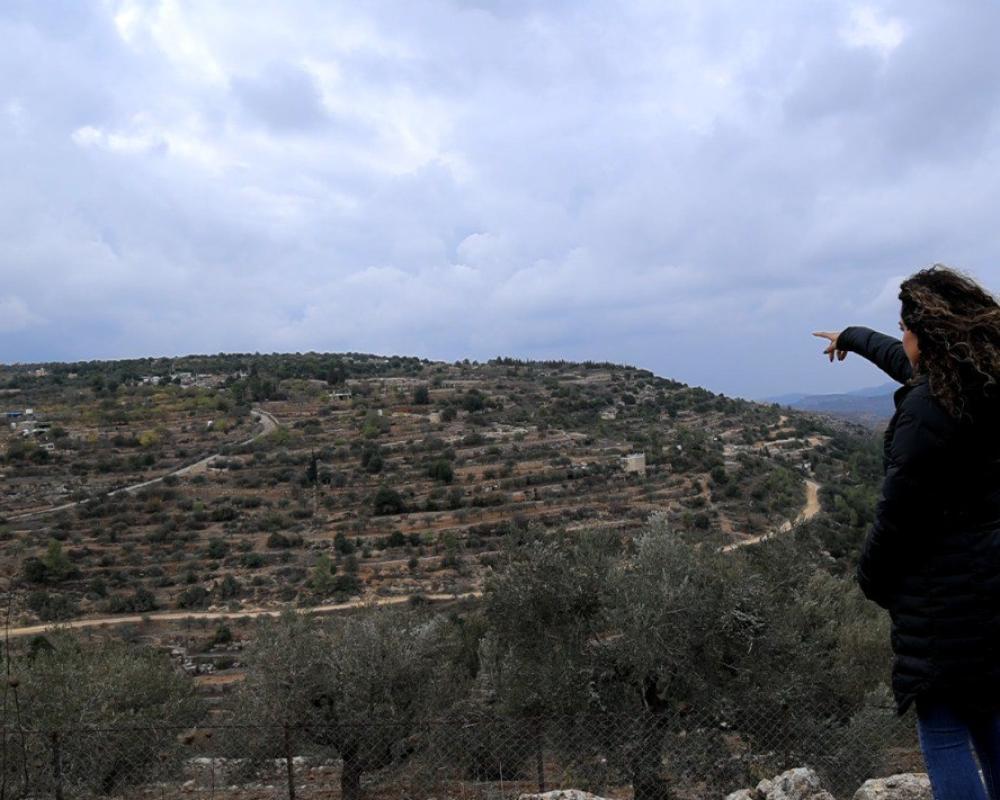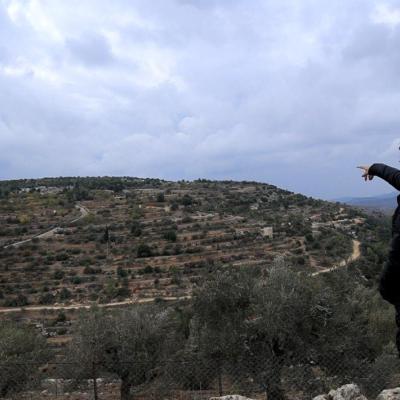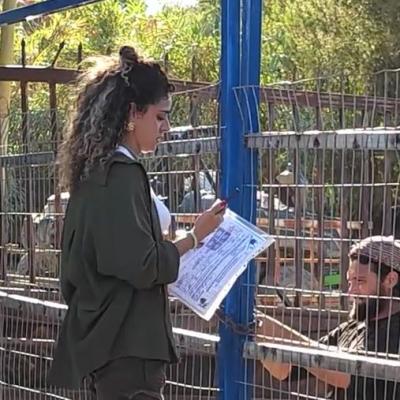
Bethlehem/PNN /
In the scenic area of Al-Makhrour in Beit Jala, the story of Alice Qaisia unfolds as a testament to Palestinian resilience in the face of Israeli occupation.
For Alice, Al-Makhrour is more than just a piece of land; it is a living memory of her childhood, where she grew up among olive and fig trees. It is where she played, harvested fruit with her family, and lived deeply rooted moments intertwined with the land.
Alic’s family, who owned land and a restaurant in the area, has faced relentless efforts by the Israeli occupation to displace them. Her father started a small restaurant in Al-Makhrour, which eventually became a beloved destination for visitors.
However, the Israeli authorities, determined to thwart Palestinian success on their land, demolished the family’s restaurant and home four times under dubious pretexts. Yet, with unwavering resolve, the family rebuilt each time.
In 2017, a settlement company called Himonta, affiliated with the Jewish National Fund, claimed ownership of the land, alleging it had been theirs since 1969. Despite the occupation's court finding no evidence to support these claims, Israeli authorities exploited a recent conflict to issue a military order forcibly seizing the land and barring Alis and her family from accessing it.
The challenges did not end there. Alisa and her mother were physically attacked by a settler disguised as a soldier, who attempted to strangle her in her car as she was recovering from surgery. “He accused me of assaulting him,” Alisa recounted, but she refused to remain a silent victim and pursued legal action against him.
“Al-Makhrour is not just land; it is our home, our memories, and our dignity. We hold onto it as firmly as the olive tree roots grip the earth,” Alisa says. For her and her family, the fight for Al-Makhrour is not just a legal battle but a fight for existence.
Today, Al-Makhrour represents more than the Qaisia family’s story; it is a symbol of Palestinian defiance against unchecked settler ambitions. With every demolition or assault, the family’s determination to protect their land grows stronger, ensuring that Al-Makhrour remains a testament to the enduring Palestinian connection to their homeland.
Al-Makhrour is a lush and fertile valley located to the west of Beit Jala, a town near Bethlehem in the occupied West Bank. Known for its olive groves, fig trees, and terraced agricultural fields, the area is celebrated for its natural beauty and rich historical significance. It has been a source of livelihood for generations of Palestinian families who cultivate the land and maintain its cultural heritage.
The area is also of significant ecological and environmental value, as it forms part of a UNESCO World Heritage Site within the cultural landscape of southern Jerusalem, Battir, and the Bethlehem region. This designation underscores its importance as an integral part of Palestinian heritage and identity.
Despite its historical and cultural importance, Al-Makhrour has been a constant target of Israeli settler expansion and land confiscation. Israeli authorities and settler organizations have repeatedly attempted to seize land in the area under the guise of legal claims, military orders, or zoning restrictions. These efforts are often accompanied by the demolition of Palestinian homes and agricultural structures, including water cisterns and retaining walls essential for traditional farming.
One of the primary settler groups involved in Al-Makhrour is Himonta, a subsidiary of the Jewish National Fund. Himonta has claimed ownership of significant portions of land in the area, despite the lack of substantial evidence to support these claims. In recent years, Israeli authorities have issued military orders to enforce these claims, effectively barring Palestinian landowners from accessing their properties.
In addition to land confiscation, Al-Makhrour faces frequent harassment from settlers, including physical attacks, vandalism, and intimidation of Palestinian residents and landowners. These actions are often aimed at pressuring Palestinians to abandon their lands, clearing the way for further settlement expansion.
Despite these challenges, Palestinian families like the Qaisi family remain steadfast in their efforts to protect Al-Makhrour. Their determination to rebuild what has been demolished and pursue legal avenues to reclaim their land embodies the broader Palestinian struggle against Israeli settlement expansion.
Al-Makhrour stands as a vivid example of the ongoing conflict over land and identity in Palestine. It highlights the resilience of Palestinian communities in the face of systematic attempts to erase their connection to their ancestral lands.
This story was produced as part of the Qarib program implemented by the French Media Development Agency (CFI) and funded by the French Development Agency (AFD).


